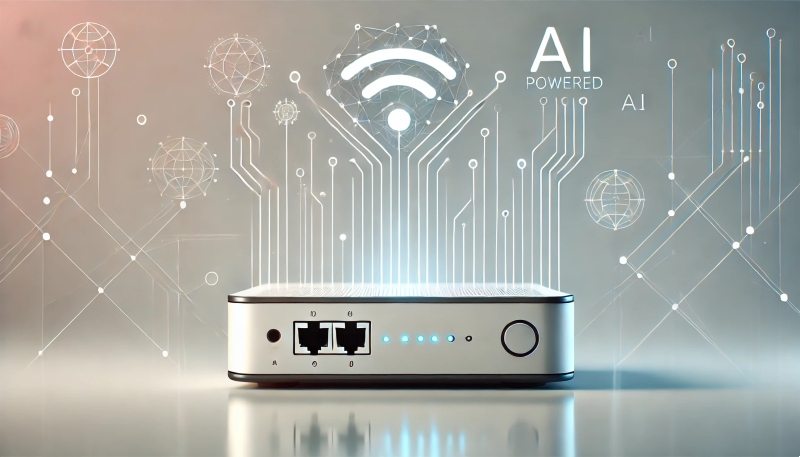As connectivity becomes increasingly vital in homes and businesses, the demand for more intelligent, self-optimizing networking solutions has grown exponentially. Enter AI-powered routers, a game-changing advancement in networking technology that leverages artificial intelligence (AI) to enhance performance, security, and user experience. In this blog, we'll explore the market dynamics, core technologies, competitive landscape, and recent developments shaping the AI-powered router space.
Market Overview
The global AI-powered router market is poised for significant growth as digital transformation and the expansion of smart homes and IoT devices fuel demand for intelligent networking solutions. According to industry analysts, the AI-powered router market is expected to grow at a CAGR of over 22.7% from 2024 to 2031. This surge is driven by the increasing complexity of home and enterprise networks, where traditional routers struggle to keep pace with bandwidth demands, security concerns, and the proliferation of connected devices.
AI-powered routers are equipped with advanced machine learning algorithms that enable them to optimize network performance, allocate bandwidth more efficiently, and detect potential threats in real time. This makes them particularly valuable in environments with high data traffic, such as smart homes, gaming setups, and business networks.
Key Technologies Driving AI-Powered Routers
- Machine Learning (ML) Algorithms: AI-powered routers utilize ML algorithms to continuously learn from network activity and optimize bandwidth allocation, ensuring that the most critical applications receive priority. By analyzing usage patterns, these routers can adapt to varying demands, providing smoother streaming, faster downloads, and seamless video conferencing.
- Network Traffic Analysis: AI-powered routers can analyze network traffic in real-time, identifying and prioritizing different types of data. For example, they can prioritize video conferencing or online gaming over background processes like software updates, ensuring minimal disruptions in high-demand applications.
- Security Enhancements: One of the standout features of AI-powered routers is their ability to enhance network security. By monitoring traffic and using AI to detect abnormal behavior, these routers can identify and neutralize potential cyber threats before they compromise the network. This includes identifying malware, phishing attacks, and unauthorized access attempts in real-time.
- Self-Optimization: AI-powered routers are capable of self-optimizing, which means they can detect network congestion or dead zones and adjust the signal strength accordingly. This eliminates the need for manual adjustments and ensures optimal network performance throughout the home or office.
- Smart Device Management: As more IoT devices connect to home and enterprise networks, AI-powered routers are designed to efficiently manage multiple devices. They intelligently allocate resources and reduce interference, ensuring that all connected devices receive the bandwidth they need to function smoothly.
Competitive Landscape
The AI-powered router market is becoming increasingly competitive, with both established players and new entrants striving to capitalize on this growing opportunity. Companies like Netgear, TP-Link, ASUS, and Google are already leading the charge by offering AI-driven routers with advanced features tailored for both consumers and businesses.
- Netgear has introduced its Nighthawk AI routers, which combine AI-powered traffic optimization with enhanced security features. These routers are particularly popular among gamers and streamers for their ability to prioritize high-bandwidth activities.
- Google Nest Wi-Fi offers a user-friendly AI-powered solution designed for smart homes, providing features like device prioritization, parental controls, and seamless integration with other smart home devices.
- TP-Link has been integrating AI-driven optimization in its Deco series routers, which leverage AI to provide more consistent coverage and better performance across large areas, making them ideal for both homes and small businesses.
- ASUS has introduced AI-enhanced routers within its RT series, designed to automatically detect and fix network bottlenecks and optimize connections for low-latency gaming and 4K streaming.
In addition to these traditional router manufacturers, companies like Plume and Eero (an Amazon company) are also making significant strides with mesh Wi-Fi systems that integrate AI to optimize network performance and coverage.
Recent Developments in AI-Powered Routers
- Netgear recently announced the addition of AI-driven parental control features to its Nighthawk line, allowing parents to monitor and control the online activity of their children more effectively.
- ASUS launched the ASUS ZenWiFi AI series, which features AI-powered network intelligence designed to optimize Wi-Fi coverage in real time and offer enhanced cyber threat detection.
- TP-Link introduced its AI Mesh technology within the Deco series, allowing users to create larger, more reliable Wi-Fi networks that automatically adapt to changes in signal strength and bandwidth demand.
- Eero has continued to integrate more AI features into its routers, including better device prioritization and smarter home network management through Alexa voice commands, improving the overall user experience.
Conclusion
AI-powered routers represent the future of networking, offering unparalleled performance, security, and adaptability. As the market for AI-driven networking solutions continues to grow, driven by increasing data demands and the rise of IoT, companies are innovating at a rapid pace. Whether you're looking for seamless streaming, enhanced security, or intelligent device management, AI-powered routers provide the next level of connectivity to meet the evolving needs of modern homes and businesses.
